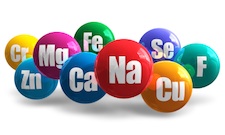Minerals
Everyone knows the benefits of vitamins, however very few people know that in order for your body to be at optimal levels, you will also need to take a well balanced mineral supplement.
 Calcium
Calcium
This mineral builds strong bones and teeth and is needed for muscle growth. Helps in normalizing blood clotting and is essential for rhythmic heart action and the transmission of nerve impulses. Also may help prevent bone loss associated with osteoporosis.
Found in milk and milk products, such as yogurt and cheese. Whole grains and unrefined cereals, green vegetables, bone meal with vitamin D, sardines, salmon, soybeans and peanuts.
Effective with Vitamin A, Vitamin C, Vitamin D, Iron, Magnesium, Manganese, and Phosphorus.
Chromium
Helps in carbohydrate utilization. Involved in metabolism of glucose (for energy) and the synthesis of fatty acids and cholesterol. Helps bring protein to where it is needed.
Essential for developing and maintaining healthy bones and teeth. Assists in blood clotting, muscle contraction and nerve transmission. Helps reduce risk of osteoporosis.
Found in unsaturated fats (such as corn oil), meats, clams, brewer's yeast, liver, whole grain, cereal, chicken, and shellfish.
The following pages will help you learn about other important minerals and their benefits for your body.